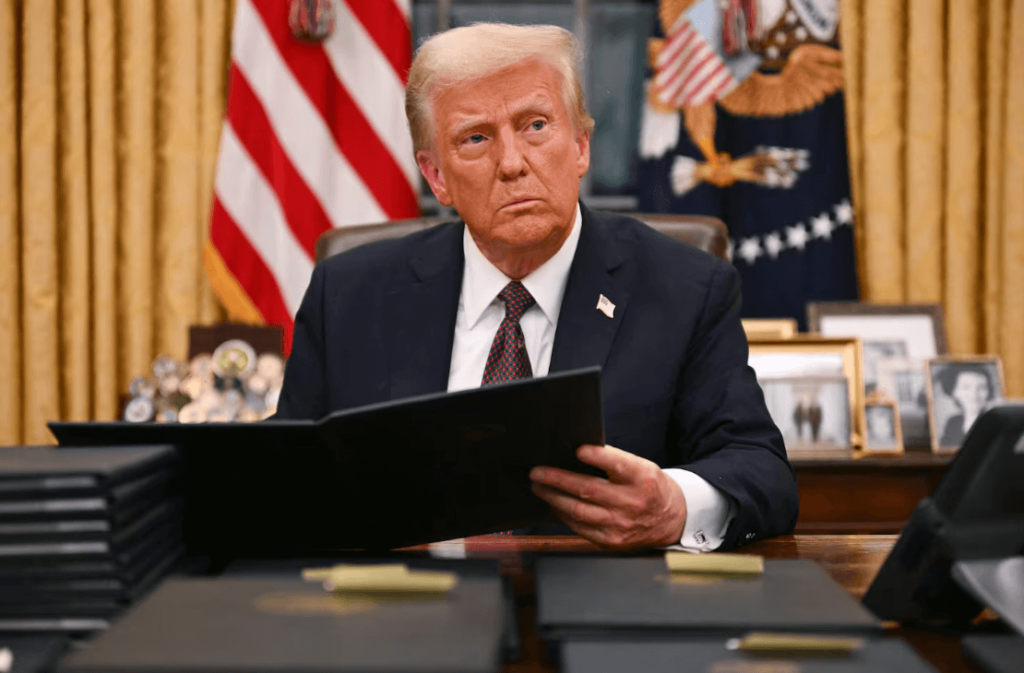【中美创新时报2025 年 1 月 22 日编译讯】(记者温友平编译)当囚犯从联邦监狱获释时,司法部会打电话给受害者,通知他们袭击他们的被告现已获释。周二,美国国会警察和华盛顿特区警察的电话一直响个不停。《纽约时报》记者卢克·布罗德沃特对此作了下述报道。
对于前国会警察中士阿奎利诺·戈内尔 (Aquilino A. Gonell) 来说,自动呼叫从周一晚上开始,一直持续到周二早上,此前唐纳德·特朗普总统对 2021 年 1 月 6 日国会大厦袭击案中近 1,600 名被告(包括被判犯有暴力罪行的人)发布了全面的法律缓刑。
上午 7:03 至上午 9:37 之间,戈内尔接到了司法部关于释放囚犯的 9 个电话。
戈内尔在袭击中遭到袭击,并因受伤而退休,他和暴力事件发生后不久一样感到愤怒和心烦意乱。
“这是对司法不公的背叛、嘲弄和对冒着生命危险捍卫我们民主的男男女女的亵渎,”他谈到近 1,600 次赦免和 14 次减刑时说道。
四年前,亲特朗普暴徒袭击国会大厦时,两家机构的 150 多名警察受伤。一些人的头部被棒球棒、旗杆和管子击中。一名警察在游行到大楼时被暴徒用金属屏障推倒,失去了知觉。
现在,许多警察表示,特朗普释放袭击者后,他们感到挣扎和沮丧。
在骚乱发生后的几天和几周内,1 月 6 日在国会大厦的几名警察死亡,其中包括被暴徒袭击的国会警察局警官 Brian D. Sicknick,他中风后于 1 月 7 日因自然原因去世。华盛顿大都会警察局的警官 Jeffrey Smith 和国会警察局的警官 Howard S. Liebengood 在暴力事件发生后的几天内自杀身亡。
布莱恩·西克尼克 (Brian Sicknick) 的哥哥克雷格·西克尼克 (Craig Sicknick) 在家中专门开辟了一块区域来纪念他的弟弟,在那里挂了一幅肖像,并在桌子上展示了口袋大小的军事勋章(即挑战币)和其他纪念品。
“我几乎每天都会想起我的弟弟,”西克尼克说。“他一生都在努力做正确的事情。他在军队服役时这样做。他作为一名警察这样做。他在个人生活中也这样做。”
西克尼克说,这些赦免令他心碎,因为那些冲击国会大厦的人将不被追究责任。
“那天我们几乎失去了民主,”他谈到 1 月 6 日时说。“今天,我真的认为我们确实失去了民主。”
周二,在国会山,共和党参议员几乎没有谴责赦免,即使是那些公开反对暴力的人。而那些公开发表言论的人经常利用这个机会谴责前总统乔·拜登和特朗普发布的赦免。
多数党领袖、南达科他州共和党参议员约翰·图恩周二回避了有关特朗普赦免暴徒是否得当的问题。
“我们着眼于未来,而不是过去,”图恩说,他称赦免是“总统的决定”。他补充说,“我们知道拜登总统大幅扩大了总统赦免权,显然我们一直都知道特朗普总统可以像大多数总统一样行使这一权力,他也确实这么做了。”
尽管如此,当天的一些受害者仍承诺继续战斗。
“对于任何关心真相、尊重法律和执法的人来说,他的赦免都是无法形容的暴行,”代表七名因袭击事件起诉特朗普的警官的律师帕特里克·A·马龙说。
“我代表的警官不会忘记!”马龙说。
哈里·邓恩是 1 月 6 日保护国会大厦的最直言不讳的警官之一,周一和周二他与前同事进行了交流。
“每个人都感到愤怒、悲伤和沮丧,”已离开国会警察局的邓恩说。
邓恩说,一名警官在长时间值班后上床睡觉,却被受害者服务部门的自动语音留言吵醒,通知他 1 月 6 日一名被告被释放。
“现在,每一位在法庭上作证的警官都接到了这些自动电话,‘嘿,这个被告将被释放’,”邓恩说。“人们接到的电话数量之多令人难以置信。”
邓恩本人表示,他心情复杂,既沮丧又无奈。
“令我震惊的是,现在每个人都对此感到惊讶和愤怒,”他说,并补充说特朗普“说他会这么做,我和其他警官的发声是为了让人们意识到接下来会发生什么。”
他补充说:“我收到了很多信息,‘哈利,你是英雄。’我不想成为英雄。我要问责。”
本文最初发表于《纽约时报》。
题图:1 月 20 日,特朗普总统在华盛顿白宫椭圆形办公室签署行政命令,赦免 1 月 6 日的罪犯。JIM WATSON/POOL/AFP via Getty Images
附原英文报道:
‘A betrayal, a mockery’: Police express outrage over Trump’s Jan. 6 pardons
By Luke Broadwater New York Times,Updated January 21, 2025
President Trump signs an executive order for pardons on Jan. 6 offenders in the Oval Office of the WHite House in Washington, on Jan. 20.JIM WATSON/POOL/AFP via Getty Images
WASHINGTON — When inmates are released from federal prison, the Justice Department places a call to their victims, notifying them that the defendant who attacked them is now free. On Tuesday, the phones of U.S. Capitol Police and D.C. police officers were buzzing nonstop.
For Aquilino A. Gonell, a former Capitol Police sergeant, the automated calls began Monday evening and continued into Tuesday morning after President Donald Trump issued a sweeping legal reprieve to all of the nearly 1,600 defendants, including those convicted of violent crimes, in the Jan. 6, 2021, attack on the Capitol.
Between 7:03 a.m. and 9:37 a.m., Gonell received nine calls from the Justice Department about the release of inmates.
Gonell, who was assaulted during the attack and retired because of the injuries he suffered, was as outraged and distraught as he was shortly after the violence.
“It’s a miscarriage of justice, a betrayal, a mockery, and a desecration of the men and women that risked their lives defending our democracy,” he said of the nearly 1,600 pardons and 14 commutations.
More than 150 police officers from the two agencies were injured during the assault on the Capitol by a pro-Trump mob four years ago. Some were hit in the head with baseball bats, flagpoles and pipes. One lost consciousness after rioters used a metal barrier to push her down as they marched to the building.
Now many of those officers described themselves as struggling and depressed in response to Trump freeing their attackers.
In the days and weeks after the riot, several police officers at the Capitol on Jan. 6 died, including Officer Brian D. Sicknick of the Capitol Police, who was attacked by the mob, suffered a stroke and died of natural causes on Jan. 7. Officers Jeffrey Smith of Washington’s Metropolitan Police Department and Howard S. Liebengood of the Capitol Police died by suicide in the days after the violence.
Craig Sicknick, the older brother of Brian Sicknick, has dedicated an area of his house to his brother, putting up a portrait and displaying the pocket-size military medallions known as challenge coins and other mementos on a table.
“I think about my brother almost every day,” Sicknick said. “He spent his life trying to do the right thing. He did it while he was in the military. He did it as a police officer. He did it in his personal life.”
The pardons, Sicknick said, leave him heartbroken that there will be no accountability for those who stormed the Capitol.
“We almost lost democracy that day,” he said of Jan. 6. “Today, I honestly think we did lose democracy.”
On Capitol Hill on Tuesday, there were few condemnations of the pardons from Republican senators, even those who have spoken out against the violence. And those who did speak out often used the occasion to condemn pardons issued by both former President Joe Biden and Trump.
Sen. John Thune, R-S.D., the majority leader, sidestepped questions on Tuesday about whether Trump acted properly in pardoning the rioters.
“We’re looking at the future, not the past,” said Thune, who called the pardons “the president’s decision.” He added, “We know the presidential pardon authority was expanded in a massive way by President Biden, and obviously we knew all along President Trump can exercise it like most presidents have, and he did.”
Still, some of the officers who were victims that day are pledging to fight on.
“For anyone who cares about truth and respect for law and law enforcement, his pardons are an unspeakable outrage,” said Patrick A. Malone, a lawyer for seven officers who sued Trump over the attack.
“The officers I represent will not forget!” Malone said.
Harry Dunn, one of the most outspoken officers who protected the Capitol on Jan. 6, spent Monday and Tuesday checking in with his former colleagues.
“Everybody’s angry and sad and devastated,” said Dunn, who has left the Capitol Police.
One officer, Dunn said, went to bed after a long shift only to be awakened by an automated voicemail from victim services informing him of the release of a Jan. 6 defendant.
“Every officer who testified in court is now getting these automated calls that, ‘Hey this defendant is being released,’” Dunn said. “The number of calls people are getting, it’s unbelievable.”
Dunn himself said he is feeling a mix of emotions, including frustration and resignation.
“It’s mind-blowing to me that everybody is now surprised and up in arms about it,” he said, adding that Trump “said he was going to do it, and what me and the other officers were doing speaking out was getting people to realize what was coming.”
He added: “I get so many messages, ‘Harry, you’re a hero.’ I don’t want to be a hero. I want accountability.”
This article originally appeared in The New York Times.
